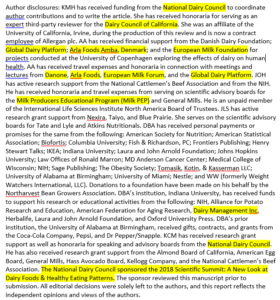Join Health Affairs for a virtual conversation between me and Angela Odoms-Young of Cornell University discussing the evolution of US food and nutrition policy, the current policy landscape, and thoughts on what lies ahead. It’s at 1:00 p.m. EDT. To join the Webinar, register here.
Industry-funded reviews of the week: dairy foods
The dairy industry, ever under siege, is doing its best to convince us to eat dairy foods. Full disclosure: I eat and like dairy foods. I do not, however, like the way the dairy industry funds research aimed at marketing its products. Here are two examples.
Example 1: Full-fat dairy foods are good for you [yes, they can be, but in moderation]
The study: Potential Cardiometabolic Health Benefits of Full-Fat Dairy: The Evidence Base. Kristin M Hirahatake, Arne Astrup, James O Hill, Joanne L Slavin, David B Allison, and Kevin C Maki. Adv Nutr 2020;00:1–15.
Conclusions: “Emerging evidence shows that the consumption of full-fat dairy foods has a neutral or inverse association with adverse cardiometabolic health outcomes, including atherosclerotic cardiovascular disease, type 2 diabetes, and associated risk factors.”
Conflicts of interest and funding (dairy groups are highlighted):
Example 2: Dairy foods can help reduce world hunger [of course they can]
The report: Dairy’s Impact on Reducing Global Hunger
Major finding: “The remarkable consistency of the positive association between dairy animal ownership,
milk/dairy intake, and child growth across the experimental and observational studies, and
the dose-response relationship between dairy consumption and child growth…provide strong evidence that, in rural
low-income settings, household milk production increases household milk consumption, and increased milk consumption results in improved child growth and reduced stunting.”
Recommendation: “dairy development needs to be accompanied by nutrition education of caregivers to ensure that milk is provided in the most critical phase of childhood, namely in the 0.5 to 2-year age group”
Sponsors: “Published by Food and Agriculture Organization of the United Nations, Global Dairy Platform and
IFCN Dairy Research Network.
Comment: It’s interesting to compare the first paper to another one done by investigators who are not funded by the dairy industry. They don’t disagree, exactly, but spin the results much less favoably. See: Milk and Health, by Walter C. Willett and David S. Ludwig. N Engl J Med 2020;382:644-54.
…guidelines for milk and equivalent dairy foods ideally should designate an acceptable intake (such as 0 to 2 servings per day for adults), deemphasize reduced-fat milk as preferable to whole milk, and discourage consumption of sugar-sweetened dairy foods in populations with high rates of overweight and
obesity.
Dairy foods are foods. Like any other, they are not essential. If you like them, eat them—in moderation, of course.


